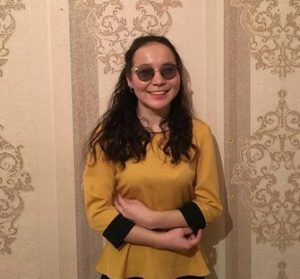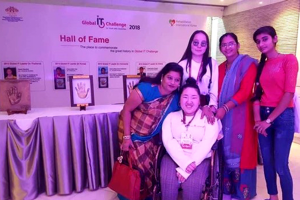By Mendee Jargalsaikhan
Our guest is a third-year student at the Mongolian International University (MIU). From her home soum in Bayankhongor Province, Ms Lkhamsuren shares with us her experience of secondary and post-secondary schools, her dream of educating the young generation, and her thoughts on an inclusive society.
Kind-hearted Teachers in Bayankhongor
She started to lose her eyesight from the eighth grade. It became worse as she went on to the ninth grade, when she could not read and write anymore at all. But her teachers and friends helped her with the lessons by reading them for her and teachers let her take oral exams, although this practice was not formally accepted. She will never forget these kind-hearted teachers and classmates in Bayankhongor. Once it became clear for her that she could not continue her schooling, she stayed with her parents who were herders. As she recalled, it was so exciting to hear about school life (‘rumours’) every time her sisters and brothers returned home during the school breaks but saddening to farewell them back to school dorms. At that time, the most difficult decision for her was whether to burn or keep her diaries. Those contained the most valuable memories of her childhood, but she could not read them. Though she accepted the fact of blindness, she could not stop thinking about schooling. Luckily, her parents were brave enough to send their daughter to the country’s only secondary school for vision-impaired children in the capital city Ulaanbaatar.
The 116th Secondary School
The first few months were so difficult, she sighed. Although she eventually learned the Braille alphabet within a month, her fingers were at first not cooperating, and the reading was most challenging. However, she made new friends who helped her to get over the challenges of Braille and the homesickness. In the first year, her dad used to visit almost every week, travelling over 800 kms from Bayankhongor to the capital city, just to check if their daughter was doing fine. She was thankful that her parents made such a brave decision to support their daughter’s dream of studying and becoming a teacher. During her study at the 116th secondary school, she noticed the significant improvement of the school’s facility and technology related to the Braille program. The school is now equipped with the Braille printing technology and software. However, young teachers need to be prepared to work with the students. There were three common problems with these new teachers: (1) some have personal issues, especially biases against the students, (2) lack of knowledge of the old and new Braille technology and programmes, and (3) no or little psychological or mental preparation. It would be extremely helpful if they had a short, practical job training before working at the secondary school. Otherwise, the students would suffer as these teachers are trying to overcome these challenges by making mistakes and increasing pressures on the students.
Studying at the University
Now Lkhamsuren is pursuing her dream of becoming an English language teacher at the Mongolian International University (MIU). After graduating from university, she wants to teach at a language learning centre or regular secondary schools, not only to show that a girl with impaired sight can pursue her dreams but also to spread knowledge about disabled people in our society. One day, her students, who will then be knowledgeable about people with disabilities, would help many understand the concept of an inclusive society. At university, she has been busy with numerous important projects. She was a member of a team composed of people with other types of disabilities. Her team successfully participated in the national as well as the regional Asia-Pacific IT competitions. Furthermore, she conducted research to assess the toilet accessibility for the people with disabilities and presented her results at an academic conference. Except for the toilets in a handful of business and service centres, most toilets were not accessible to people with disabilities – not even for a person without disabilities.
What Should Be Done
The laws, regulations, and standards, need to be complied with by the construction companies in order to improve the accessibility of the infrastructure for people with disabilities. The statements of our earlier guests resonate with Lkhamsuren: buildings, roads, and washrooms, should be universally accessible for all people (elders, sick, or with small children). Therefore, it is not an issue that concerns only people in wheelchairs or people with walking sticks. According to our guest, two things should be done: (1) the standards must be inspected and hold responsible those failed to comply these standards, and (2) people who are designing and building should consider the users of these facilities.
Another suggestion for improvement is to increase the use of the internet for the dissemination of information to people with disabilities and to parents with disabled children. The government organizations and non-governmental organizations could provide more information about their activities to the public. Instead of targeting only people with disabilities, the online platform should be used to promote the idea of an inclusive society. They could create contents and programmes for adults, school children, and even kindergarteners. Why do we not, for example, create cartoons about five friends, and one of them has a disability. This will help small children learn about children with disabilities, and eventually change their attitudes towards their friends with disabilities. It would teach them that a person in a wheelchair could dance, and a blind person could read.
Education – Everyone Should Promote
Our guest was constantly emphasising the importance of education. Education will help people with disabilities unlock their potential and pursue their dreams. There are three reasons for which children with disabilities cannot pursue education. First, they and their parents do not know about their capability to learn and develop. Second, there are only a handful of schools with limited space. For instance, there is only one secondary school for children with impaired eyesight in the entire country. Parents, especially those residing in the countryside, cannot send their children away due to financial constraints. Third, parents just do not want to send their children to school because they want to keep them close by. To change these types of negative attitudes, the government should send out positive messages about schooling children with disabilities to the parents, as well as their children. Lkhamsuren hopes that social influencers could take a lead in this regard. In that way, they would encourage parents to send their children to school and contribute to better public awareness about disabilities.
Impacts of the COVID-19
The pandemic hits everyone hard. It was quite difficult financially when she was at the dormitory during the lockdown, even though the school provided some support. Once she was back with her siblings in the home soum, things got better. However, she could not visit her parents who are herding the cattle in the countryside. Her brothers and sisters have fallen behind in their schooling. For her, online schooling became the new normal. Indeed, we all hope things will go back to normal and that Lkhamsuren can visit her parents as often as she pleases.
There were many topics we could talk about with Lkhamsuren, and we know there are many stories which she would like to share. Here is one piece of advice for our readers and listeners. In our conversation, several examples came up about how people get nervous when they meet or talk to people with impaired eyesight. She advised that we should treat any person with disability just like any other normal person. Of course, there are some challenges these people experience – but they want to be treated as equals. So, if you want to talk to a person with a white cane or a person in a wheelchair, speak and act normally.
The Untold podcast and blog post are made available by the generous support of the Friedrich Ebert Foundation in Mongolia. We also want to thank our editor Riya Tikku.



 Follow
Follow